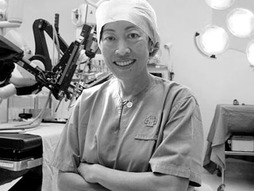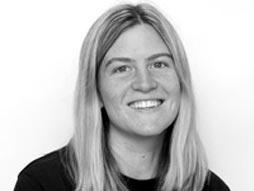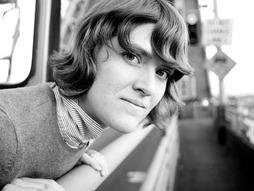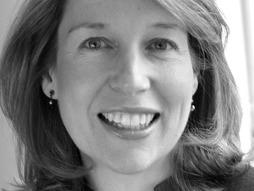 Pioneering surgeon Susan Lim performed the first liver transplant in Asia.
Pioneering surgeon Susan Lim performed the first liver transplant in Asia.
But a moral concern with transplants (where do donor livers come from ...) led her to look further, and to ask: Could we be transplanting cells, not whole organs?
At the INK Conference, she talks through her new research, discovering healing cells in some surprising places.
A surgical pioneer in Singapore, Susan Lim is a researcher and entrepreneur.
Susan Lim established her reputation as a surgeon in 1990 after performing Singapore's (and southeast Asia's) first successful liver transplant.
She has gone on to further pioneer in the field of general surgery, two new surgical technologies for Singapore, the mammotome minimally invasive breast biopsy and robotic surgery for the private sector.
2011-04-20
Posted in TED Talks (Individual)
 Days before this talk, journalist Naomi Klein was on a boat in the Gulf of Mexico, looking at the catastrophic results of BP's risky pursuit of oil.
Days before this talk, journalist Naomi Klein was on a boat in the Gulf of Mexico, looking at the catastrophic results of BP's risky pursuit of oil.
Our societies have become addicted to extreme risk in finding new energy, new financial instruments and more ... and too often, we're left to clean up a mess afterward. Klein's question: What's the backup plan?
2011-01-18
Posted in TED Talks (Individual)
 In today's world, balancing school, work, kids and more, most of us can only hope for the recommended eight hours of sleep.
In today's world, balancing school, work, kids and more, most of us can only hope for the recommended eight hours of sleep.
Examining the science behind our body's internal clock, Jessa Gamble reveals the surprising and substantial program of rest we should be observing.
Jessa Gamble writes about sleep and time, showing how our internal body clock struggles against our always-on global culture.
Jessa Gamble is an award-winning writer from Oxford, who lives in the Canadian Subarctic. Now that humanity has spread right to the Earth's poles and adopted a 24-hour business day, Gamble argues that our internal clocks struggle against our urban schedules.
2011-01-17
Posted in TED Talks (Individual)
 Technology is evolving us, says Amber Case, as we become a screen-staring, button-clicking new version of homo sapiens.
Technology is evolving us, says Amber Case, as we become a screen-staring, button-clicking new version of homo sapiens.
We now rely on "external brains" (cell phones and computers) to communicate, remember, even live out secondary lives. But will these machines ultimately connect or conquer us? Case offers surprising insight into our cyborg selves.
Amber Case studies the symbiotic interactions between humans and machines -- and considers how our values and culture are being shaped by living lives increasingly mediated by high technology.
Amber Case is a cyborg anthropologist, examining the way humans and technology interact and evolve together.
2011-01-12
Posted in TED Talks (Individual)
 Working with a team of physicists, Dr. Deborah Rhodes developed a new tool for tumor detection that's 3 times as effective as traditional mammograms for women with dense breast tissue.
Working with a team of physicists, Dr. Deborah Rhodes developed a new tool for tumor detection that's 3 times as effective as traditional mammograms for women with dense breast tissue.
The life-saving implications are stunning. So why haven't we heard of it? Rhodes shares the story behind the tool's creation, and the web of politics and economics that keep it from mainstream use.
Deborah Rhodes is an expert at managing breast-cancer risk. The director of the Mayo Clinic’s Executive Health Program is now testing a gamma camera that can see tumors that get missed by mammography.
For all of the lives it saves, mammography still cannot detect the early onset of breast cancer in as many as one of every four women ages 40 to 49.
2011-01-09
Posted in TED Talks (Individual)
 Pioneering surgeon Susan Lim performed the first liver transplant in Asia.
Pioneering surgeon Susan Lim performed the first liver transplant in Asia. Days before this talk, journalist Naomi Klein was on a boat in the Gulf of Mexico, looking at the catastrophic results of BP's risky pursuit of oil.
Days before this talk, journalist Naomi Klein was on a boat in the Gulf of Mexico, looking at the catastrophic results of BP's risky pursuit of oil. In today's world, balancing school, work, kids and more, most of us can only hope for the recommended eight hours of sleep.
In today's world, balancing school, work, kids and more, most of us can only hope for the recommended eight hours of sleep. Technology is evolving us, says Amber Case, as we become a screen-staring, button-clicking new version of homo sapiens.
Technology is evolving us, says Amber Case, as we become a screen-staring, button-clicking new version of homo sapiens. Working with a team of physicists, Dr. Deborah Rhodes developed a new tool for tumor detection that's 3 times as effective as traditional mammograms for women with dense breast tissue.
Working with a team of physicists, Dr. Deborah Rhodes developed a new tool for tumor detection that's 3 times as effective as traditional mammograms for women with dense breast tissue.